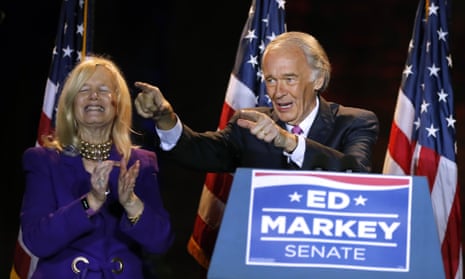US climate advocates have their highest-profile evidence yet that putting the crisis first can win elections. And it arrived in an unlikely package: a 74-year-old Senate incumbent, who garnered intense grassroots support from young activists.
Ed Markey this week won a decisive victory in the Massachusetts Democratic primary election over Joe Kennedy who was challenging for his seat, the latest scion of the American political dynasty who had backing from the country’s top Democrat, the House speaker, Nancy Pelosi.
John Podesta, who was Barack Obama’s climate adviser, said Markey’s win “sent a resounding message: the politics of climate have changed and embracing bold climate action is a winning message in tough races”.
Markey was trailing Kennedy earlier in the race, before the youth-led Sunrise Movement intervened to back him as one of their biggest allies in the Senate. Volunteers phone-banked and provided the content for a much-heralded campaign ad where Markey repurposed John F Kennedy’s historic phrase as president and told Americans to “start asking what your country can do for you”.
It came as no surprise that climate was the major focus of Markey’s campaign. He introduced the Green New Deal alongside the New York congresswoman Alexandria Ocasio-Cortez last year. And his name is on the Waxman-Markey climate bill of 2009, which is the closest Congress has ever come to taking significant action on climate change.
For years, polls have shown that a majority of Americans are concerned about climate change, and many rank it among their top issues. But few campaigns have sought to make virtually an entire campaign about the crisis as Markey did.
“We see that climate has risen as a major issue for Democrats and is especially important to the more progressive wing of the Democratic party,” said Edward Maibach, who directs George Mason University’s Center for Climate Change Communication and routinely surveys Americans on the issue.
“I think that came through loudly and clearly, and we’re going to see it come through loudly and clearly in other elections this fall.”
Varshini Prakash, the executive director of the Sunrise Movement, said the group’s volunteers made hundreds of thousands of calls to encourage voters to support Markey. A hub of high-schoolers in Lexington, Massachusetts, conducted 14 phone-banking events even before they joined up with the national group, she said.
Prakash said: “There is no more visible leader on the Green New Deal than Ed Markey, save AOC [Ocasio-Cortez].
“We realized early on … this was a guy who we haven’t always agreed with necessarily but who championed our flagship policy and somebody that we had to defend at all costs.”
As the group Data for Progress put it shortly before the election: “Markey is an ally, and the left is out to prove that becoming an ally is more than just not a hazard to your career – it’s a benefit.”
Climate advocacy isn’t always a silver bullet. In another race in Massachusetts, Alex Morse, the progressive climate candidate challenging the House ways and means chairman, Richard Neal, lost.
But Maggie Thomas, political director at advocacy group Evergreen Action, said the climate crisis is no longer just one campaign issue among many.
With hurricanes on the Gulf coast, wildfires in California and a derecho – an intense wind storm – in Iowa, she said: “We are seeing the effects of climate all around us.
“Climate change looks different in lots of different places. The specifics of how Markey campaigned on climate doesn’t mean it’s an exact plug-and-play for how someone else might run on climate, but I think that what it does show is that you can campaign on climate and you can win on climate.”
